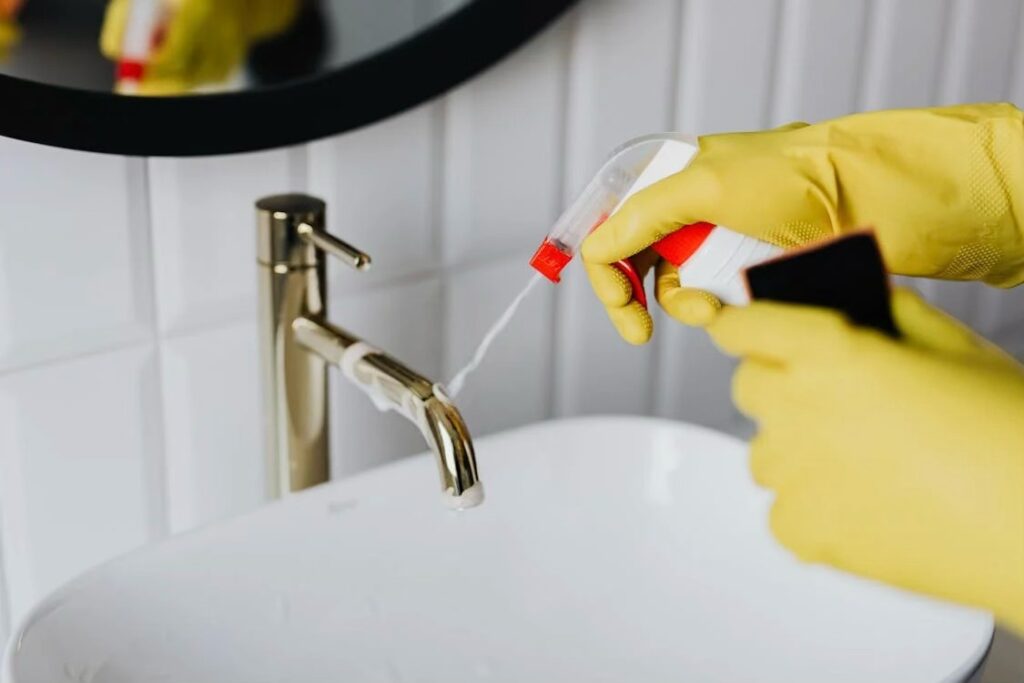Maintaining your bathroom isn’t just about keeping it clean. It’s about ensuring safety and efficiency too.
From stopping leaks to preventing water damage, small DIY tasks can make a huge difference.
Think about replacing that worn-out shower door seal or tightening loose fixtures.
You don’t need to be an expert; just practical know-how can go a long way.
Curious how you can get started? Dive in with us as we explore the ins and outs of easy, effective bathroom maintenance tips for homeowners like you.
Preventing Mold and Mildew with Proper Ventilation
Albeit inevitable, dampness is a bathroom’s worst enemy, promoting mold and mildew growth. This can cause health issues like allergies or respiratory problems. Proper ventilation plays a key role in combating these problems.
Ensuring your bathroom fan works effectively helps control moisture levels after hot showers. Windows also offer natural airflow, pushing out damp air and bringing in fresh breezes.
Investing in a dehumidifier provides an extra layer of protection by keeping humidity at bay year-round. Consider it the silent guardian that keeps your bathroom dry, healthy, and mold-free.
Benefits of Regularly Replacing Shower Door Seals
Privacy, cushioning, temperature control, preventing leaks; shower door seals do more than you might think. These unsung heroes ensure water stays where it belongs—inside the shower.
Over time, wear and tear can cause gaps and cracks that let water escape, leading to slippery floors or even structural damage. New seals also improve energy efficiency by maintaining a consistent bathroom temperature during those relaxing hot showers.
High-quality seals prevent mildew buildup around your doors’ edges too. Considering something sleek like a frameless shower door seal offers both functionality and aesthetic appeal for glass enclosures.
So don’t underestimate this small yet significant bathroom component—it’s essential for safety and longevity.
Fixing Common Bathroom Leaks: A DIY Guide
Bathroom leaks can put your home’s safety and efficiency in jeopardy. How, you ask? You see, even minor drips waste gallons of water over time and can cause costly damage.
To tackle this issue effectively:
- Identify the source by inspecting visible pipes and fixtures
- Tighten or replace worn-out washers in faucets
- Seal gaps around shower heads with plumber’s tape
- Check toilet flappers for a secure fit
Each of these steps helps mitigate the risk of long-term issues. Identifying the source early prevents extensive damage. Tightening washers save water immediately. Properly sealing gaps maintains pressure balance while checking toilet flappers ensures efficient flushes.
Understanding these basics empowers you to keep your bathroom leak-free without needing a professional every time.
Ensuring Efficient Water Flow in Your Sink and Shower
Sinks and showers rely heavily on efficient water flow for optimal performance. When water pressure dips, daily routines turn frustrating.
Key points to check include:
- Clearing out clogged aerators
- Inspecting shower heads for mineral buildup
- Ensuring proper pipe diameter
Clearing clogs maintains a steady flow. Mineral buildup hampers pressure, so cleaning or replacing parts is vital. Pipe size directly affects efficiency, so if issues persist, you might want to upgrade your shower to modern fixtures designed for better flow.
By focusing on these areas, you ensure a smoother experience every time you turn on the tap.
Safe Cleaning Solutions for Different Bathroom Surfaces
A big part of bathroom maintenance indeed involves keeping it sparkling, but safety is just as crucial. Each surface has its cleaning quirks.
Tile and grout benefit from mild bleach solutions to prevent mold without damaging material. Vinegar works wonders on glass surfaces, offering a streak-free shine without harsh chemicals. For countertops and fixtures, pH-neutral cleaners preserve finishes while eliminating germs.
Choosing the right products ensures not only cleanliness but also longevity of your bathroom elements—safe and sound.
Quick Tips to Avoid Costly Plumbing Repairs
It’s hard to talk about bathroom maintenance without touching diligently on plumbing. A well-maintained system prevents hefty repair bills.
Consider these essential tips:
- Regularly inspect for leaks
- Avoid using harsh chemicals in drains
- Replace aging pipes and fixtures promptly
- Insulate pipes during colder months
Regular inspections catch issues early, saving you from water damage. Harsh chemicals corrode pipes over time, so gentle cleaners are a better choice. Aging components are ticking time bombs—replace them before they fail catastrophically. And insulating pipes guard against burst incidents in winter.
Following these simple steps can keep your plumbing in top shape and your wallet intact.
Taking charge of your bathroom’s maintenance ensures a safe, efficient home. Implement these simple tips to protect your investment and enjoy peace of mind knowing you’ve tackled potential issues head-on. Your future self will thank you!

